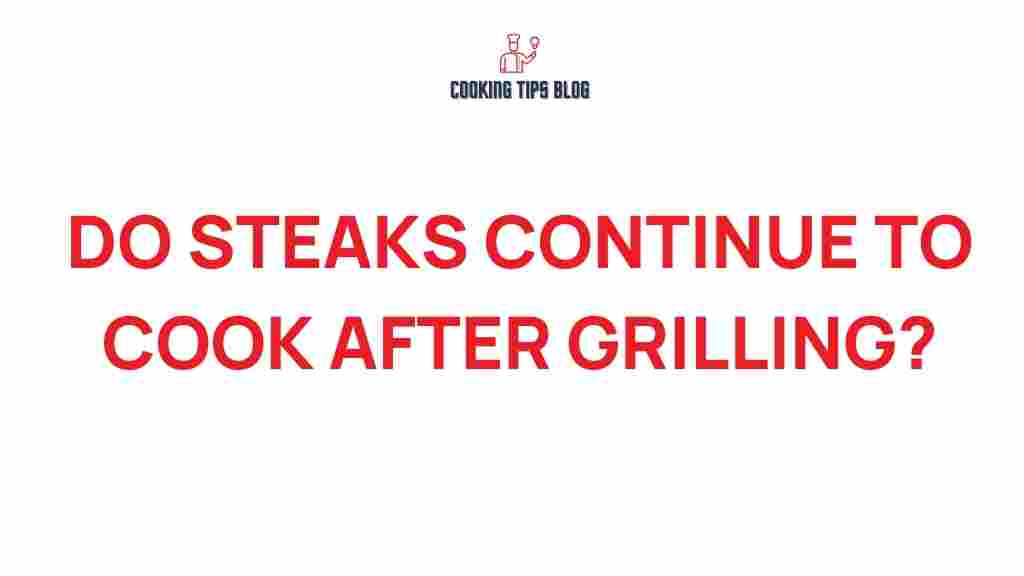The Science Behind Steaks: Do They Keep Cooking After Grilling?
Grilling the perfect steak is a culinary art that many strive to master, but the science behind it is equally important. One common question that arises among grilling enthusiasts is: do steaks continue to cook after being removed from the grill? Understanding the science of heat transfer, carryover cooking, and the ideal internal temperature can help you achieve the perfect steak every time.
Understanding Carryover Cooking
Carryover cooking refers to the phenomenon where food continues to cook even after it has been removed from a heat source. This is particularly relevant for steaks, as they can retain heat and continue to rise in temperature once they are off the grill. Here’s how it works:
- Heat Retention: Steaks, being dense cuts of meat, can retain heat for a considerable amount of time.
- Internal Temperature Rise: After grilling, the internal temperature of a steak can rise by as much as 5 to 10 degrees Fahrenheit.
- Cooking Process: The proteins in the steak continue to cook as they redistribute heat throughout the meat.
Understanding carryover cooking is crucial for achieving the desired doneness in your steaks without overcooking them on the grill.
Factors Affecting Carryover Cooking
Several factors influence how much a steak will continue to cook after being taken off the grill:
- Thickness of the Steak: Thicker steaks will retain heat longer and experience more carryover cooking than thinner cuts.
- Initial Cooking Temperature: Steaks cooked at higher temperatures will have a greater degree of carryover cooking.
- Resting Time: Allowing the steak to rest after grilling enhances the carryover effect, as it gives time for the heat to distribute evenly.
- Ambient Temperature: If the surrounding temperature is cooler, it may decrease the carryover effect.
How to Calculate the Ideal Cooking Temperature for Steaks
To ensure your steaks are cooked perfectly, it’s essential to know the target internal temperature for different levels of doneness:
- Rare: 125°F (52°C)
- Medium Rare: 135°F (57°C)
- Medium: 145°F (63°C)
- Medium Well: 150°F (66°C)
- Well Done: 160°F (71°C)
When cooking steaks, consider the carryover cooking effect. For example, if you want a medium-rare steak, you might pull it off the grill at around 130°F (54°C) to account for the additional cooking that will occur during resting.
Step-by-Step Process of Grilling the Perfect Steak
Here’s a comprehensive step-by-step guide to grilling steaks while considering the science behind carryover cooking:
Step 1: Choose Your Steak
Select a high-quality cut of steak, such as ribeye, filet mignon, or strip steak. The marbling and thickness of the steak will affect both its flavor and how it cooks.
Step 2: Prepare the Steak
Allow the steak to come to room temperature before grilling. Season it generously with salt and pepper, and add any other preferred seasonings.
Step 3: Preheat the Grill
Preheat your grill to high heat (around 450°F to 500°F). A hot grill is essential for achieving a nice sear on the steak.
Step 4: Grill the Steak
Place the steak on the grill and cook for about 4-5 minutes on each side for a medium-rare result. Use a meat thermometer to check the internal temperature.
Step 5: Remove and Rest
Once the steak reaches your desired temperature, remove it from the grill. Let it rest for 5-10 minutes. This resting period allows the juices to redistribute and for carryover cooking to finish the cooking process.
Step 6: Slice and Serve
After resting, slice the steak against the grain and serve. Enjoy the juicy, perfectly cooked steak!
Troubleshooting Tips for Grilling Steaks
Even seasoned grillers can face challenges when cooking steaks. Here are some common issues and how to resolve them:
- Steak Is Overcooked: If your steak is overcooked, it could be due to cooking it too long or not accounting for carryover cooking. Use a meat thermometer to avoid this issue next time.
- Steak Is Too Tough: Tough steaks can result from undercooking or from using lower-quality cuts. Always choose a well-marbled steak for better tenderness.
- Steak Lacks Flavor: Ensure you season your steak adequately before grilling. Marinades and rubs can also enhance flavor.
For more grilling tips, check out this comprehensive grilling guide.
Conclusion
In conclusion, understanding the science behind steaks and how they continue to cook after grilling is essential for any grilling enthusiast. Carryover cooking plays a significant role in achieving the perfect steak. By selecting the right cut, paying attention to cooking temperatures, and allowing your steak to rest, you can elevate your grilling game. Remember, the key to a perfect steak lies not just in the grilling process but also in understanding how heat affects the cooking of meat. So next time you fire up the grill, keep these principles in mind for a delightful steak experience!
For further reading on steak cooking techniques, visit this detailed resource.
This article is in the category Tools and created by Cookingtipsblog Team
